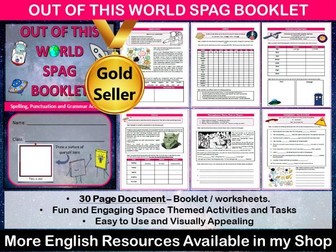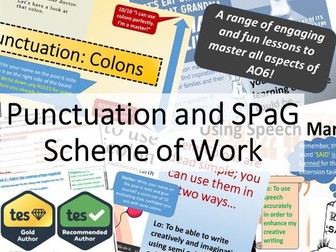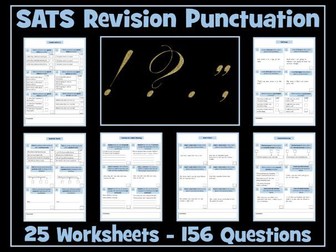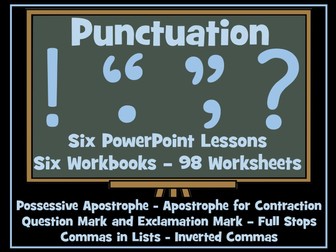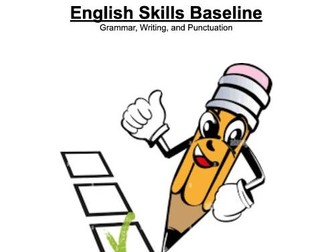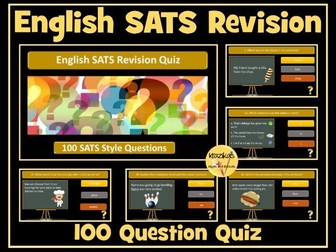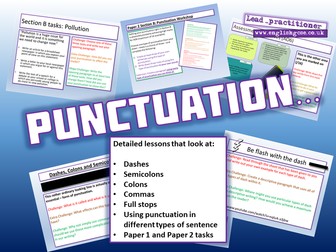
Spelling, Punctuation and Grammar Booklet
A fun and engaging space-themed booklet - designed to help students practice their key spelling, grammar and punctuation skills. This 30 page booklet contains activities and tasks covering:
word classes
prefixes / suffixes
plurals
verb tenses
capital letters
speech marks
high frequency words
proofreading
comprehension
end/ beginning sounds
synonyms/ antonyms
and more!
This document can be used as a booklet or printed off as individual worksheets. Perfect for whole class use, SEND/EAL/Lower ability interventions, homework, home learning and more.
Check out my shop for loads more free and inexpensive KS3 & KS4, Literacy and whole school resources.

Grammar and Punctuation Revision Game
A simple but effective game which revises different parts of grammar and punctuation.
Pupils play in teams. They choose an area (eg verbs) from the game board. The PowerPoint will throw up a question about the chosen area and reveal the answer when clicked.
This activity can easily last a whole one hour lesson. Pupils enjoy the competitive element. It can be used as a ‘fun’ way to revise grammar terminology in preparation for the KS2 SATs.
Categories in the game: verbs, connectives, adverbs, subject and object, names for words (eg plural, antonym), prepositions and articles, adjectives and determiners, apostrophes, various punctuation.

English KS3 Punctuation
KS3 English lesson focusing on improving our punctuation and grammar. Includes differentiated worksheets on a number of areas including commas, full stops, capital letters, semicolons, dashes, paragraphs and more! A fantastically detailed and differentiated lesson that can be adapted for other texts and age groups. Very useful for KS3 English students preparing for AQA English Language Paper 2 Question 5 and for GCSE English Language Paper 2 students as well.
Check out our English Shop for loads more free and inexpensive KS3, KS4, KS5, Literacy and whole school resources.
AQA English Language Paper 1 and Paper 2 Knowledge Organisers
AQA English Language Paper 1 Section A package
AQA English Language Paper 1 Sections A and B package
AQA English Language Paper 1 package
AQA English Language Paper 2 Question 5 package
AQA English Language Paper 1 Question 5 package
AQA English Language Paper 2 Section A package
AQA English Language and English Literature revision package
An Inspector Calls whole scheme package
An Inspector Calls revision package
Macbeth whole scheme package
Macbeth revision package
A Christmas Carol whole scheme package
A Christmas Carol revision package
Jekyll and Hyde whole scheme package
Jekyll and Hyde revision package
Romeo and Juliet whole scheme package
Power and Conflict poetry comparing poems package
Power and Conflict poetry whole scheme package
Love and Relationships poetry whole scheme package
Unseen Poetry whole scheme package
Or check out some Citizenship GCSE, RE, PSHE + RSE resources at EC Resources

100 punctuation and grammar starters
PPt containing 100 grammar and punctuation activities with accompanying answers.
Useful for starters at KS3 or for KS2 SATs SPAG practice.

Punctuation and SPaG Scheme of Work
Complete Punctuation and SPaG scheme of work for Key Stage 3 and GCSE. It’s time to win the battle against poor grammar and punctuation once and for all!
Complete unit of work which will allow your students to master advanced punctuation as well as engage with a range of exciting creative writing tasks. If you are anything like me, explicit teaching/reminding of how to properly apply punctuation is ESSENTIAL for all ability ranges, especially with the new specification GCSE placing so much emphasis on AO6.
These lessons are certainly geared more towards KS3 and KS4 students. Powerpoints are light hearted and fun, with plenty of images/colour and silly jokes to keep your students engaged and entertained. I’ve found these lessons serve as an excellent ‘crash course’ in punctuation either at the beginning of the academic year or in the run up to the GCSE exams. Below is a list of contents:
Commas (£2 if purchased on its own) -
Commas powerpoint lessons
Commas in a list worksheet
Commas in a complex sentences worksheet
Colons (£2 if purchased on its own) -
Colon powerpoint lessons
Mastering colons worksheet
Semi-Colons (£2 if purchased on its own)-
Semi-colon lesson powerpoints
Semi-colon worksheets (x2)
Semi-colon writing success criteria worksheet
Speech- (£2 if purchased on its own)
Speech powerpoint lessons
Speech worksheet
Speech mixed practice worksheet
Writing success criteria worksheet
Editing and proof reading - (£3 if purchased on its own)
Editing and proof reading mini scheme powerpoint (nearly 50 slides)
Editing and proof reading worksheets (£2 if purchased separately)
A wide range of proof reading worksheets that you can use to consolidate and improve your student’s SPaG and proof reading abilities after you have finished the unit of work.
This unit would suit a range of abilities as there is lots of scope for stretch and challenge, with ambitious success criteria and extension tasks built in throughout. Scaffolding and differentiation options are built in where appropriate.
Fully resourced and ready to roll, minimal adaptation or tweaking required.
This is obviously a SPaG/Punctuation scheme of work, but it is equally focused on creative/descriptive writing too. Much of the content is therefore ideal for teaching general creative writing skills or preparing for the fiction writing task on the new specification (9-1) GCSE English Language exam.
Grab a bargain compared to buying these resources separately.
If you loved the resource and think it’s worth 5 stars, why not get another one absolutely free?
Simply leave a review, email ireviewedajs@outlook.com with your TES username and state the free resource* you would like!
(Free resource cannot exceed the value of the original resource purchased)
undefined

Punctuation
I'm using this as a reminder to pupils (and I am embarrassed to say which year they are in!) but I thought it could be useful to others.
A ppt for recapping how to use some punctuation in a sentence correctly, looking specifically at questions and statements, capital letters, and apostrophes (with omission only, not possession - that will come in another ppt later).

SATS English Revision: Punctuation
This resource contains a set of 156 SATS style questions (25 pages) on all aspects of punctuation. It is an ideal SATS practice resource and also a useful assessment tool to identify what pupils have achieved and what they need to work on in punctuation. A pupil assessment sheet is also included. The resource includes questions on the following:
Capital Letters
Full Stops
Question Mark
Exclamation Mark
Commas in Lists
Commas after Fronted Adverbials
Commas to Clarify Meaning
Colons
Semi-Colons
Apostrophes for Possession
Apostrophes for Contraction
Hyphens
Single Dash
Ellipsis
Inverted Commas
Brackets
You may also be interested in:
Key Stage 2 SATS Grammar Questions- Grammatical Terms and Word Classes - 11 Worksheets - 66 Questions
Key Stage 2 100 Question SPaG SATS Revision PowerPoint Quiz
This resource contains a quiz/revision resource on KS2 SATS English - spelling punctuation and grammar. The questions are in SATS style and include questions on grammatical terms, word/classes, combining words, punctuation and spelling.
More SATS English Resources
Thinking of publishing your own resources or already an author and want to improve your resources and sales? Check out this step-by-step guide:
How to Become a Successful TES Author: Step-by-Step Guide
Bundle

Punctuation
This bundle contains six PowerPoint lessons and six workbooks on the following punctuation devices:
The Possessive Apostrophe
The Apostrophe for Omission
Commas in Lists
The Question Mark and Exclamation Mark
Inverted Comma (Speech Marks)
Full Stops
The Possessive Apostrophe
This resource contains an editable, 60-slide PowerPoint lesson on the possessive apostrophe. It explains how to use the apostrophe to show possession for singular and plural nouns. The PowerPoint provides lots of examples and opportunities for students to use the apostrophe appropriately. The presentation also includes a hyperlink to a short video on the apostrophe for possession.
The workbook contains 15 worksheets on the possessive apostrophe/apostrophe for possession for both singular and plural nouns. It also contains an information sheet on how to use apostrophes for possession.
The Apostrophe for Omission
This is an editable, 50 slide PowerPoint lesson on the apostrophe for contraction / omission. It explains how to use the apostrophe in contracted words. This resource will help students to use apostrophes appropriately in their written work and to improve their punctuation skills. The PowerPoint also contains a hyperlink to a short video explaining how to use the apostrophe for contraction.
The workbook includes an information sheet explaining when and how to use the apostrophe for omission/contraction. It also contains a variety of tasks that will help students to master using apostrophes appropriately in their written work and to improve their punctuation skills. Answers are included.
Commas in Lists
This is a fully editable, 35-slide PowerPoint lesson on using the comma in lists in sentences. The PowerPoint explains how to use the comma in lists in sentences. There are opportunities for pupils to insert the comma in the correct place. There are also opportunities for pupils to identify where the comma has been misplaced.
The 20-page workbook includes 18 worksheets and 2 information sheets on using commas to demarcate items / phrases within sentences and to separate adjectives when there are two or more describing a noun. It is an ideal independent learning pack for home learning, distance learning and remote learning. Tasks include:
inserting commas in the correct places in sentences
rewriting incorrectly punctuated sentences
composing own sentences containing a list of items
composing own sentences using two or more adjectives
punctuating The Twelve Days of Christmas with commas
composing own lyrics for the Twelve Days of Christmas and punctuating with commas
The Question Mark and Exclamation Mark
This is an editable, 52-slide PowerPoint lesson on the question mark and exclamation mark. The presentation explains when these punctuation marks are used and gives many examples. It also provides opportunities for pupils to decide the correct punctuation at the end of a sentence - exclamation mark, question mark or full stop. The PowerPoint also contains two hyperlinks to short videos about the question mark and the exclamation mark.
The workbook contains 9 worksheets with answers and an information sheet on using the question mark and the exclamation mark. Tasks include:
Selecting the correct question word for sentences.
Deciding which punctuation device should be used at the end of sentences.
Composing sentences using question marks appropriately.
Composing sentences using exclamation marks appropriately.
Rewriting a short passage inserting the correct punctuation devices - full stop, question mark or exclamation mark.
Inverted Comma (Speech Marks)
This editable, 75-slide Powerpoint lesson on inverted commas (speech marks/quotation marks) demonstrates how to:
use inverted commas to enclose direct speech
punctuate reporting clauses and direct speech
punctuate split speech
set out dialogue in writing
use interesting words to replace ‘said’
Many opportunities are provided within the PowerPoint for pupils to punctuate direct speech.
The 22 page workbook on inverted commas contains five information/revision sheets, seventeen worksheets and an answer booklet. Tasks include:
using inverted commas to enclose direct speech
punctuating reporting clauses and direct speech
punctuating split speech
setting out direct speech in dialogue
using alternative words to ‘said’ in reporting clauses
composing writing containing direct speech
Full Stops
This editable, 50-slide PowerPoint lesson explains how and when to use the full stop and why it is important to place it accurately in writing. It also clearly demonstrates that a capital letter is needed at the start of a sentence. Ample opportunities are provided throughout the PowerPoint for pupils to decide where the full stops and capital letters should go.
The workbook contains 14 worksheets on using full stops to demarcate sentences. Tasks include:
Placing full stops at the end of simple sentences
Placing full stops in writing containing several sentences
Placing full stops in short paragraphs
Composing own sentences
Correcting sentences in which the full stops have been incorrectly placed
If you buy this resource and are pleased with your purchase, I would be extremely grateful if you could leave a review. As a token of appreciation, you can have a free resource of your choice up to the same value as your purchased resource. Just email inspireandeducate@aol.co.uk with your user name, the resource you have reviewed and the resource you would like for free.
More English Resources
Thinking of publishing your own resources or already an author and want to improve your resources and sales? Check out this step-by-step guide:
How to Become a Successful TES Author: Step-by-Step Guide

SATS Punctuation and Grammar Revision Year 6
This powerpoint dedicates each slide to a different area of the punctuation and grammar SATs test. It is highly useful when revising the concepts the children must know for the test in an engaging way. All slides followed by an answer slide!
The powerpoint covers:
Phrases (adverbial, prepositional & noun)
Prepositions
Co-ordinating and subordinating conjunctions
Main & subordinate clauses
Relative clauses
Modal verbs
Determiners
Prefixes and suffixes
Root words
Subject-verb agreement
Pronouns
Active & passive voice
Synonyms & antonyms
Progressive tense
Perfect tense
Word classes
Hyphens
Colons, semi-colons and dashes
Apostrophe for contraction and possession

English Skills Baseline - Grammar, Writing, and Punctuation
Fifty-one multiple choice questions and one writing task designed to give you valuable insights into your students’ language abilities.
This test covers a range of topics including:
Basic Language Skills: This section assesses the students’ knowledge of the English language by testing their understanding of the alphabet, adjectives, verbs, nouns, adverbs, and connectives.
Sentence Structure Identification: This section tests the students’ ability to identify different types of sentences, including simple, compound, and complex sentences.
Noun Types and Modifiers: This section tests the students’ ability to identify collective nouns, plural nouns, fronted adverbials, expanded noun phrases, concrete nouns, and abstract nouns.
Figurative Language
This section tests the student’s understanding of figurative language, including similes, metaphors, personification, oxymorons, descriptive language, sensory details, alliteration, and assonance.
Punctuation Usage: This section tests the students’ knowledge of common punctuation symbols, such as full stops, question marks, exclamation marks, commas, quotation marks, and apostrophes.
Creative Writing Techniques: This section assesses the students’ ability to structure and organise their creative writing, as well as their ability to use different writing techniques to capture the reader’s attention.
Reading Comprehension
This section of the test helps you assess a student’s reading comprehension abilities. It can also help you to identify if your students may need additional support or instruction in this area. Additionally, this exercise can help you to gauge how well your students are able to extract and comprehend information from written material, which is an essential skill in many academic areas.
Creative Writing
This section is designed to help you assess your student’s ability to communicate their ideas in a clear and organised manner, their ability to engage and maintain the interest of the reader, and their ability to use appropriate grammar, punctuation, and vocabulary. This information can help the you tailor your instruction to meet the needs of individual students and to help them improve their writing skills.
------------------------------------------------------------------------
Not only will this test help you identify areas where your students need additional support, but it also comes with a mark scheme that includes low, mid, and high-ability example answers for the writing section. This makes it easy for you to quickly evaluate your students’ work and track their progress over time.

Manipulating structure and punctuation for creative writing
Two engaging lesson on varying sentence structures and using punctuation for effect. Includes a range of activities and detailed worksheets that really encourage pupils to see the merit of more varied structural choices, as well as emphasises the significance of technical accuracy. Worked extremely well and had high impact on my own classes.
Suitable for both KS3 and KS4.

PUNCTUATION Worksheet
A reminder of the different punctuation marks and a few sentences to punctuate to the right.

Punctuation
A series of notes and exercises, giving students practice in all of the basic punctuation / speech marks.

Year 3 SPAG Punctuation
10 differentiated worksheets to practise the Year 3 punctuation objectives:
using apostrophes for possession
using capital letters
using inverted commas
using punctuation at the end of a sentence.
Images from Pixabay

Punctuation
PowerPoint presentation which helps students understand different punctuation marks and when to use them.
This is a visual presentation that can be printed and used as classroom display/posters.
There are two short activities for students to complete at the end of the presentation.
Punctuation marks addressed:
Full stops
Capital letters
Commas
Apostrophes
Colon
Semi-colon
Question Marks
Exclamation Marks
Hope you enjoy :)

SATS English: Spelling, Punctuation and Grammar Revision Quiz
This resource contains a quiz/revision resource on KS2 SATS English - spelling punctuation and grammar. It can be used as a quiz or as a revision resource.
The quiz can be administered in a variety of ways - to individuals or teams. The answers can be found by clicking on the question image on the bottom right-hand corner of each slide. Answers can be given either as you go through the quiz or at the end. An answer sheet is included to record answers.
The quiz includes SATS style questions on:
grammatical terms, word/classes - nouns, verbs, adjectives, coordinating and subjunctive conjunctions, pronouns possessive, relative, adverbs, adverbials, prepositions, determiners, subject and object, verb tenses, modal verbs, present and past progressive,passive and active, clauses - main, fronted adverbials, subordinate, relational, punctuation - full stops, commas in lists, commas to clarify meaning, question marks, exclamation marks, inverted commas, apostrophes, colons, semi-colons, capital letters, hyphens, direct speech, brackets, determiners, articles - definite and indefinite, function of sentences - declarative, interrogative, imperative and exclamatory sentences (statement, question, command, exclamation), vocabulary -synonyms and antonyms, prefixes and suffixes, spelling - homophones and plurals.
You may also be interested in:
Key Stage 2 SPaG SATS Set of 66 SATS Style Questions
This resource contains a set of 66 SATS style questions on grammatical terms and word classes. The resource includes questions on the following:
Nouns
Verbs
Adjectives
Conjunctions
Pronouns
Possessive Pronouns
Relative Pronouns
Adverbs
Prepositions
Determiners
Subject and Object
Thinking of publishing your own resources or already an author and want to improve your resources and sales? Check out this step-by-step guide:
How to Become a Successful TES Author: Step-by-Step Guide

Punctuation Revision and Worksheets
This 31 page booklet includes explanation and activities on: apostrophes, brackets, capital letters, colons, commas, dashes, exclamation marks, full stops, question marks, semi colons, hyphens and speech marks.
Bundle

Punctuation and SPaG
Three punctuation lessons that make a dry topic a little more engaging. Includes specific resources on:
Commas
Full stops
Dashes
Semicolons
Colons
Putting punctuation into sentences
Paper 1 and 2 style tasks
Check out our English Shop for loads more free and inexpensive KS3, KS4, KS5, Literacy and whole school resources.
AQA English Language Paper 1 and Paper 2 Knowledge Organisers
AQA English Language Paper 1 Section A package
AQA English Language Paper 1 Sections A and B package
AQA English Language Paper 1 package
AQA English Language Paper 2 Question 5 package
AQA English Language Paper 1 Question 5 package
AQA English Language Paper 2 Section A package
AQA English Language and English Literature revision package
An Inspector Calls whole scheme package
An Inspector Calls revision package
Macbeth whole scheme package
Macbeth revision package
A Christmas Carol whole scheme package
A Christmas Carol revision package
Jekyll and Hyde whole scheme package
Jekyll and Hyde revision package
Romeo and Juliet whole scheme package
Power and Conflict poetry comparing poems package
Power and Conflict poetry whole scheme package
Love and Relationships poetry whole scheme package
Unseen Poetry whole scheme package
Or check out some Citizenship GCSE, RE, PSHE + RSE resources at EC Resources

English Punctuation
KS3 English punctuation non-fiction lesson for English Language Paper 2. Students choose from five differentiated worksheets (all differentiated to three levels) and making improvements in using full stops, commas, capital letters, hyphens, dashes and apostrophes. This helps the students to reflect on how they can write their own non-fiction pieces and make improvements to their use of punctuation.
Includes examples, success criteria, scaffolds and more.
Useful preparation for both Section A and Question 5 of GCSE English Language exams, but designed for KS3 students. Includes teacher and student notes as well as differentiated activities throughout.
Check out our English Shop for loads more free and inexpensive KS3, KS4, KS5, Literacy and whole school resources.
AQA English Language Paper 1 and Paper 2 Knowledge Organisers
AQA English Language Paper 1 Section A package
AQA English Language Paper 1 Sections A and B package
AQA English Language Paper 1 package
AQA English Language Paper 2 Question 5 package
AQA English Language Paper 1 Question 5 package
AQA English Language Paper 2 Section A package
AQA English Language and English Literature revision package
An Inspector Calls whole scheme package
An Inspector Calls revision package
Macbeth whole scheme package
Macbeth revision package
A Christmas Carol whole scheme package
A Christmas Carol revision package
Jekyll and Hyde whole scheme package
Jekyll and Hyde revision package
Romeo and Juliet whole scheme package
Power and Conflict poetry comparing poems package
Power and Conflict poetry whole scheme package
Love and Relationships poetry whole scheme package
Unseen Poetry whole scheme package
Or check out some Citizenship GCSE, RE, PSHE + RSE resources at EC Resources

